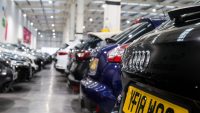Potential strike action at the DVLA over Covid outbreaks shouldn’t have much of an effect on dealers, says an industry expert.
Cox Automotive insight and strategy director Philip Nothard said it would be more of an ‘annoyance’ than anything if it did go ahead.
Staff in Swansea have voted to take industrial action because they say they feel unsafe there.
Since September, more than 500 cases have been reported at the site, which employs over 6,000 people, and on a turnout of 50 per cent 72 per cent of PCS union members said they were in favour of walking out, reported the BBC.
The union is holding talks with its members and management at the government agency as it decides what steps to take.
But if a strike is called while the industry is looking to get back on its feet again, Nothard thinks the effect will be ‘minimal’.
It could cause longer waiting times when registering for V5 replacements and plate transfers but most services would be unaffected by the action, he said.
‘At the moment, the DVLA are in talks with their workforce and I think it is likely that this will end up being a storm in a teacup.
‘If there is something credible then it could pose a slight danger to the sector in terms of delaying a return to normality.
‘Having said that, I think it would be more of an annoyance than anything more damaging.
‘DVLA processes are now done a lot more digitally and there is less reliance on physical paperwork being processed.
Trends
‘You’re only really looking towards V5 replacements and plate transfers. Taxing a vehicle or putting it on SORN can both be done online.’
He was speaking after Cox Automotive posted its mid-month update looking at trends in the industry.
The report found that used car prices and demand have now returned to where they were before the third lockdown.
In terms of the new car market, sales look set to topple the same time as last year – the month the first national lockdown was announced.
Nothard added: ‘We are now on March 19 with showrooms closing last year on March 23.
‘The new car market had already slowed down by that point as the pandemic had impacted on other areas.
‘It was a case of people wondering what the government was going to do, with European markets already feeling the sting.
‘We are probably about 30 to 35 per cent behind last year’s new car registrations but it’s very hard to tell at what point last year everything changed.
‘In a normal March, you would expect to see around 400,000 new car registrations. Last year, that was down at 254,000.
‘For this year, we are on course for 270,000 to 300,000 registrations, which shows we are slowly heading back in the right direction.’


































